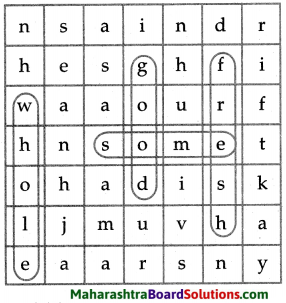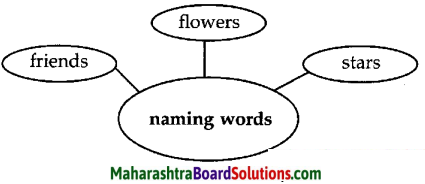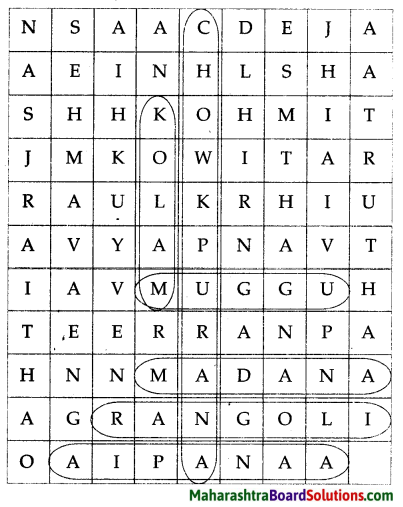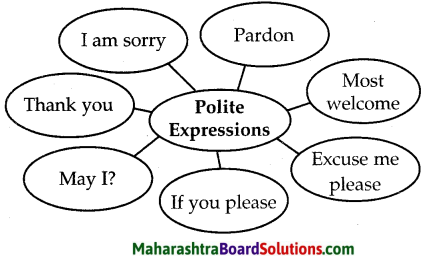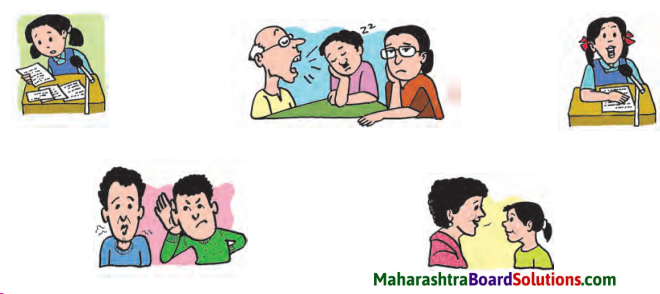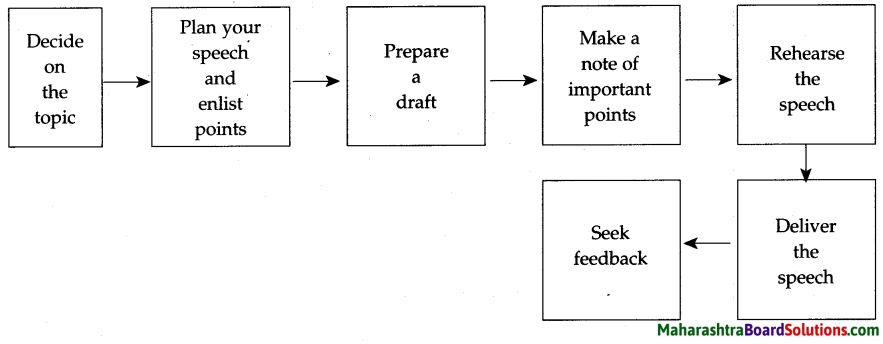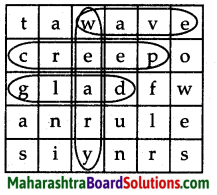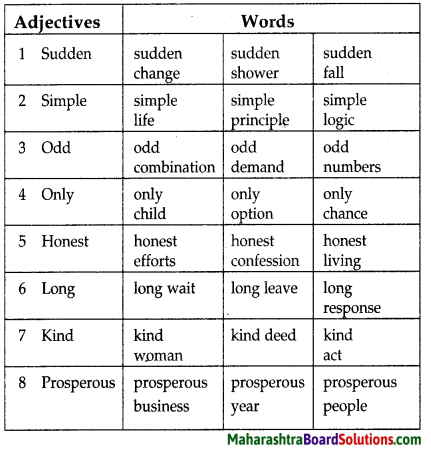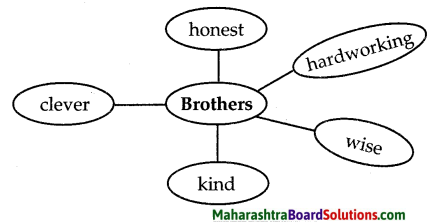Std 5 English Lesson No 9 The Triantiwontigongolope Question Answer Maharashtra Board
Balbharti Maharashtra State Board Class 5 English Solutions Chapter 9 The Triantiwontigongolope Notes, Textbook Exercise Important Questions and Answers.
5th Std English Poem The Triantiwontigongolope Question Answer
English Balbharati Std 5 Digest Chapter 9 The Triantiwontigongolope Textbook Questions and Answers
1. Read the poem aloud using proper intonation.
Question 1.
Read the poem aloud using proper intonation.
![]()
2. Note that we say ‘its appetite’, ‘its manners’ and not “it’s appetite’ or ‘it’s manners’.
It’s means ‘It is’ and its means ‘belonging to it.
Question 1.
Note that we say ‘its appetite’, ‘its manners’ and not “it’s appetite’ or ‘it’s manners’.
It’s means ‘It is’ and its means ‘belonging to it.
Answer:
Now, read the following sentences.
- Its response was overwhelming,
- It’s not good to be dishonest.
- It’s a beautiful day,
- It’s a pleasant surprise.
- Its results will reveal if the experiment was a success.
- Its conclusion was unclear.
![]()
3. Activities
1. Is the insect described in the poem a real insect? Think about an imaginary creature. Describe it in your own words. You may draw its picture and label it.
Question 1.
Is the insect described in the poem a real insect? Think about an imaginary creature. Describe it in your own words. You may draw its picture and label it.
Answer:
The insect described in the poem is not real but imaginary by the poet’s own admission at the end of the poem. Let me tell you about Hopperslipograssipede, my friend, who lives in my garden. It thrives on plants. When no one is around it changes its colour according to its own whims and fancies.
2. Think of other funny names for imaginary creatures. Write any 3 of them.
Question 1.
Think of other funny names for imaginary creatures. Write any 3 of them.
Answer:
- Hopperslipograssipede
- Cenacaciapidekatydid
- Alfalfaaerialweevil
![]()
English Balbharati Std 5 Answers Chapter 9 The Triantiwontigongolope Additional Important Questions and Answers
Answer the following questions.
Question 1.
What is the poem about?
Answer:
The poem is about an imaginary insect The Triantiwontigongolope’. The poet describes its funny ways only to disclose in the end that it was all a joke.
![]()
Question 2.
What does the insect live on?
Answer:
The insect lives on weeds and wattle-gum.
Question 3.
What does Trianti wontigongolope do when we call it by its name?
Answer:
When we call Triantiwontigongolope by its name, it makes a sound of contentment, with a sense of pride.
Question 4.
The poet reveals in the end that it was a joke.
Were you disappointed by this confession? Justify your answer.
Answer:
The humorous character in the story made me laugh heartily but at the same time I was disappointed that I won’t be able to see the insect as it does not exist.
![]()
Language Study
Question 1.
Pick out a word indicating sound from the poem:
Answer:
Purrs
Question 2.
Match the rhyming words.
| A | B |
| 1. toes | a. name |
| 2. shame | b. nose |
| 3. confess | c. green |
| 4. been | d. address |
Answer:
| A | B |
| 1. toes | a. name |
| 2. shame | a. name |
| 3. confess | d. address |
| 4. been | c. green |
What do the underlined words mean:
Question 1.
If you sneer at it or scold it, it will scuttle off
in shame.
Answer:
If we scorn or scold the insect it will run away in shame.
![]()
Question 2.
It lives on weeds and wattle-gum and has a funny face.
Answer:
It eats weeds and wattle-gum and it has a funny face.
Question 3.
Fill in the blanks with ‘it’s’ and ‘its’
- ……… effect is severe.
- ………. your choice.
- ………. a possibility.
- ………. impact was strong.
- …………. the most severe earthquake Nepal has ever witnessed.
Answer:
- Its
- It’s
- It’s
- Its
- Its
![]()
Reading Skills, Vocabulary and Grammar
Read the following extract and answer the questions given below:
Question 1.
Complete the web
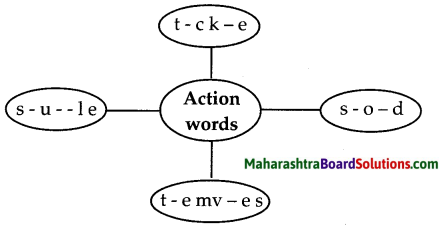
Answer:
- tickle
- scold
- trembles
- scuttle
Select the proper alternative and complete the following:
Question 1.
Triantiwontigongolope ………………………. if you tread upon its toes.
(a) smiles
(b) trembles
(c) scuttles
Answer:
(b) trembles
![]()
Question 2.
Pick out a line to prove that Trianti wontigongolope does not exist.
Answer:
For there isn’t such an insect.
Question 3.
The poet reveals in the end that it was a joke.
Were you disappointed by this confession? Justify your answer.
Answer:
The humorous character in the story made me laugh heartily but at the same time. I am disappointed that I won’t be able to see the insect as it does not exist.
The Triantiwontigongolope Summary in English
Summary :
The humorous poem ‘The Triantiwontigongolope’ written by C. J. Dennis tickles the reader’s funny bones and ushers laughter. The main character of this poem is a very funny insect with a very funny name. The poet describes its physical appearance, eating habits and other activities. At the end of the poem, the poet surprises us by concluding that the insect is imaginary and does not exist. We are willing to forgive the poet for his prank. After all, didn’t he make us laugh to our heart’s content?
![]()
Meanings :
- spy (o) – catch sight of
- spider (n) – a small insect with eight legs.
- beetle (n) – an insect with wings which are hard.
- bee (n) – an insect which provides honey
- woolly (adj.) – covered with wool.
- grub (n) – a worm-like larva of an insect
- weeds (n) – unwanted wild plants
- wattlegum (n) – an Australian gum
- appetite (n) – desire for food
- disgrace (n) – loss of respect due to one’s action
- scare (v) – cause fear
- mope (v) – feel low and dejected
- tremble (v) – to shake due to excitement or fraility
- tickle (o) – light touch by someone which evokes laughter
- tread (v) – walk in a specific manner
- snubbish (adj.) – somewhat short and turned up at the end
- scold (v) – to rebuke
- scuttle (o) – to run hurriedly
- purrs (u) – sound that cat makes
- confess (o) – admit
- forgive (v) – cease or stop feeling angry or bitter towards someone for their mistake / their action.
English Balbharati Workbook Std 5 Answers Unit 2
- The Triantiwontigongolope Class 5 English Solutions
- Three Sacks of Rice Class 5 English Solutions
- Be a Good Speaker Class 5 English Solutions
- Count your Garden Class 5 English Solutions
- The Adventures of Gulliver Class 5 English Solutions
- A Lesson for All Class 5 English Solutions
- Bird Bath Class 5 English Solutions
- Write your own Story Class 5 English Solutions
